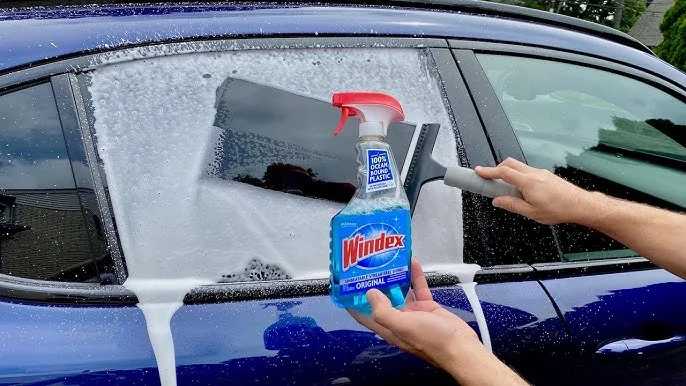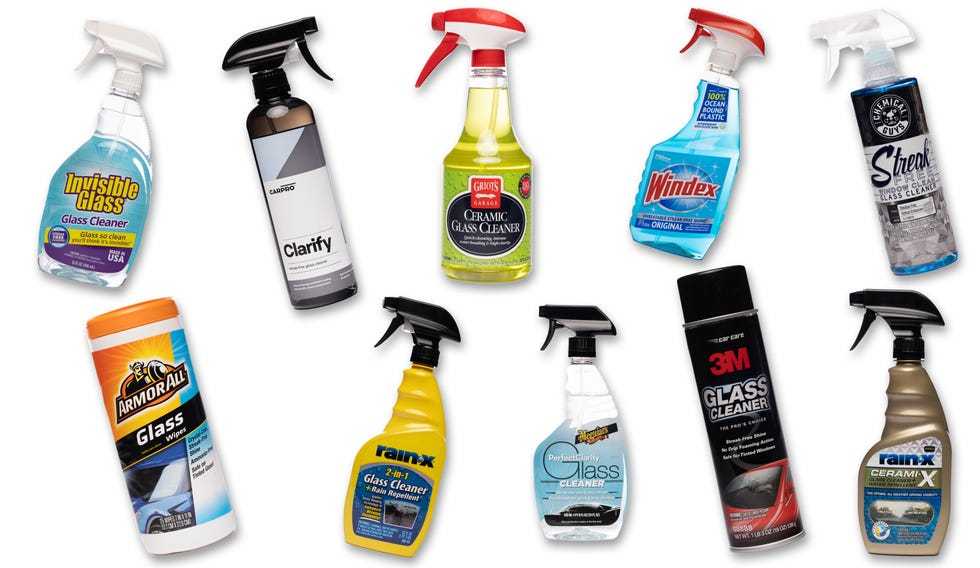Yes, you can use glass cleaner on your car windows, but with some caution. It’s a quick and effective way to get rid of dirt, grime, and streaks, leaving your windows crystal clear. However, not all glass cleaners are suitable for automotive use, so choosing the right product is key to avoid damage or film buildup.
Using a specialized glass cleaner made for cars is generally safe and recommended. It’s important to avoid household cleaners that contain ammonia or harsh chemicals, as they can harm tinted windows or leave residues that reduce visibility. Properly cleaning your car windows with the right product can enhance safety and improve the overall appearance of your vehicle, making driving safer and more enjoyable.
Can I Use Glass Cleaner on Car Windows?
Many drivers wonder if they can use their regular glass cleaner on the windows of their cars. It’s common to have leftover glass cleaner from cleaning windows around the house, but is it safe to use on your car? The quick answer is yes, but with some important considerations.
Understanding the Composition of Glass Cleaners
Most glass cleaners contain ingredients like ammonia, alcohol, or vinegar, which help break down dirt and stains on glass surfaces. These ingredients work well on household windows but may not always be ideal for vehicle glass.
Ammonia-based cleaners are very effective at providing a streak-free shine. However, they can sometimes cause damage to tinted windows or certain coatings on car glass, making it necessary to choose the right product.
Are Glass Cleaners Safe for Car Windows?
Effect on Different Types of Car Glass
Car windows can be made of standard glass or have special coatings like anti-reflective or UV-protective layers. While general glass cleaners are safe for standard windows, they may harm coatings if used excessively or with harsh chemicals.
If your car has tinted windows, using glass cleaner with ammonia could cause the tint to peel or become cloudy over time. It’s best to check your car’s window specifications before cleaning.
The Impact of Harsh Chemicals
Some cleaners contain strong chemicals that can damage rubber seals and defrosting systems around your windows. Using a mild, car-specific cleaner reduces the risk of deterioration.
Look for products labeled “safe for automotive glass” to ensure they won’t cause harm over repeated use.
How to Properly Use Glass Cleaner on Car Windows
Choosing the Right Cleaner
Opt for a cleaner that is specifically made for automotive use. If you only have household glass cleaner, ensure it’s ammonia-free to avoid damaging tint or coatings.
Read the label carefully to verify it’s safe for car windows or tinted film.
Preparation Before Cleaning
Start by removing loose debris or dirt with a soft brush or microfiber cloth. This step prevents scratching the glass during cleaning.
Park your vehicle in a shaded area to prevent the cleaner from drying too fast, which could cause streaks.
Cleaning Process Step-by-Step
- Spray the cleaner evenly on the window surface.
- Use a clean, soft microfiber cloth or squeegee to wipe the glass gently in a circular motion.
- Repeat if necessary for stubborn spots or bird droppings.
- For a streak-free finish, buff the glass with a dry section of the cloth after cleaning.
Tips for Achieving Crystal Clear Car Windows
- Use a dedicated microfiber cloth designed for glass to avoid scratches.
- Clean your windows regularly to prevent build-up of dirt and grime.
- Avoid using paper towels or rough cloths that can scratch the glass surface.
- Consider using a glass cleaner with a rain-repellent formula for better visibility during rainstorms.
- Don’t forget to clean the inside of the windows, which often accumulates smoke film and fingerprints.
Potential Risks of Using Household Glass Cleaners on Cars
Possible Damage to Tinting and Coatings
Regular household glass cleaners with ammonia can cause tinting films to peel or discolor over time. Coatings designed to reduce glare or UV Rays may also be compromised.
To prevent this, always check your vehicle’s manufacturer recommendations or use products explicitly labeled safe for automotive glass.
Risk of Smudging or Streaks
Using cleaners that are not formulated for automotive use might leave streaks or smudges, reducing visibility. Proper application and wiping techniques are key to achieving a clear view.
Alternatives to Traditional Glass Cleaner
DIY Natural Glass Cleaners
You can make a simple, effective cleaner at home using ingredients like vinegar and water. Mix equal parts of distilled water and white vinegar in a spray bottle.
This solution is eco-friendly, cost-effective, and safe for most car surfaces, provided the tint and coatings are compatible.
Commercial Car Glass Cleaners
Brands designed specifically for automotive glass often contain ingredients that won’t harm the glass or coatings. They also usually come with instructions for best results.
Look for products with the words “streak-free,” “anti-fog,” or “rain-repellent” for added benefits.
When to Seek Professional Help
If your car windows have stubborn stains, oxidation, or damage to coatings, it’s best to consult a professional. They can clean or repair your windows properly without risking further harm.
Professionals can also advise on the best cleaning products suited to your vehicle’s specific needs.
Summary of Key Points
| Aspect | Details |
|---|---|
| Is it safe to use household glass cleaner? | Yes, if it’s ammonia-free and used carefully. Avoid ammonia-based cleaners for tinted windows. |
| How to use glass cleaner effectively? | Spray lightly, wipe with a microfiber cloth, and buff dry for a streak-free finish. |
| What are potential risks? | Damage to tint, coatings, seals, or leaving streaks if used improperly. |
| Best alternatives? | Car-specific cleaners or homemade vinegar solutions. |
Additional Topics to Explore
- How to maintain clean car windows long-term
- The importance of cleaning windshields for driver safety
- Differences between cleaning interior and exterior glass surfaces
- Choosing eco-friendly cleaning products for car maintenance
In summary, while you can use household glass cleaner on car windows, it’s important to do so carefully and with the right products. Opt for ammonia-free options and follow proper cleaning steps to keep your windows clear, shiny, and free of damage. Remember, using the appropriate cleaning method helps maintain the integrity of your vehicle’s glass and ensures optimal visibility while driving.
The Easiest Way To Clean The Inside of Your Windshield (No Streaks!)
Frequently Asked Questions
Is it safe to use regular glass cleaner on tinted car windows?
Using regular glass cleaner on tinted windows generally does not cause damage, but it’s important to choose a cleaner that is specifically formulated for tinted glass. Some cleaners contain alcohol or ammonia, which can degrade window tint over time, causing discoloration or peeling. Always check the label to ensure the product is safe for tinted surfaces. If you’re uncertain, opt for a cleaner labeled as safe for tinted windows to protect your investment.
Can glass cleaner leave streaks on my car windows?
Yes, if not applied properly, glass cleaner can leave streaks or residue on your car windows. To avoid this, spray the cleaner onto a clean microfiber cloth rather than directly onto the glass. Wipe the windows with gentle, circular motions and then buff with a dry cloth. Proper technique ensures a clear, streak-free finish that improves visibility and enhances the appearance of your car.
Are there specific ingredients I should look for or avoid in glass cleaners for car windows?
Look for glass cleaners that do not contain ammonia or harsh chemicals, as these can damage interior components and tint films. Instead, choose products with safer, non-abrasive ingredients that effectively clean without leaving residues. Natural or eco-friendly cleaning formulas can also reduce the risk of any adverse effects on your vehicle’s glass and interior.
Can I use a household glass cleaner to clean my car’s windows?
While some household glass cleaners may work, they are not always ideal for vehicles. Many contain chemicals that can leave residues or damage window tint and rubber seals. It’s best to select a cleaner designed specifically for automotive use, ensuring it cleans effectively without harming your vehicle’s surfaces.
How often should I clean my car windows using glass cleaner?
You should clean your car windows with glass cleaner at least once a month to maintain clear visibility and a neat appearance. If you notice dirt, smudges, or streaks more frequently, consider cleaning them more often. Regular cleaning also helps prevent the buildup of grime that can be more difficult to remove over time.
Final Thoughts
Using glass cleaner on car windows is generally safe and effective. It removes dirt, streaks, and grime, leaving windows clear and spotless. Just ensure the cleaner is designed for automotive use, as household glass cleaners might contain ingredients that could damage the tint or seals.
Always follow the manufacturer’s instructions for best results and avoid spraying directly on sensitive areas.
Can I use glass cleaner on car windows? Yes, but choose a product made specifically for cars to avoid potential damage.



